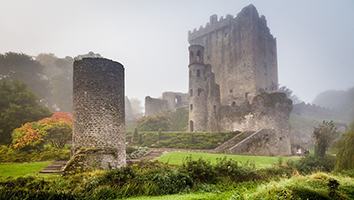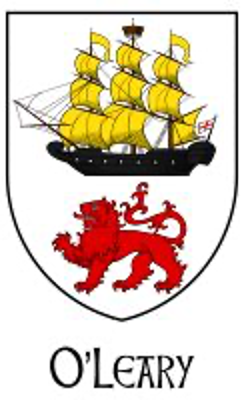https://en.wikipedia.org/wiki/OLeary
http://www.olearyfarms.com/oleary.htm
https://www.theirishrose.com/name-histories-coat-of-arms/oleary-name-history/
https://www.johngrenham.com/surnamescode
This great and noble surname, with variant spellings Leary and Learie, is an Anglicized form of the Old Gaelic “O’Laoghaire”. The Gaelic prefix “O” indicates “grandson” or “male descendant of”, plus the personal byname “Laoghaire”, a compound of “laugh”, calf, plus “aire”, keeper; hence, “keeper of the calves”.
Laoghaire was the name borne by a 5th Century King of Ireland who reigned at the time of St. Patrick, circa 432, and it is from him that present day name-bearers claim descent. The port Dun Laoghaire in County Dublin was named in his honour, the first element “dun” meaning “fort”.
The O’Learys were chiefly located in the ancient territory of Muscraidhe where they ruled as chiefs under the paramount MacCarthys. Their territory embraced north-west and central County Cork, and Inchigeela was their main centre; two places called Ballyleary (from “baile”, a town or settlement) are located in County Cork.
Famous name-bearers were Peadar O’Laoghaire (1839 – 1919), called in his day “the greatest living master of Gaelic prose”, and John O’Leary (1830 – 1907), the Fenian.
The first recorded spelling of the family name is shown to be that of Mahon O’Leary, who went to Spain with d’Aquila, which was dated 1601, Participants in the Battle of Kinsale, County Cork, during the reign of Queen Elizabeth 1 of England, known as “Good Queen Bess”, 1558 – 1603.
Surnames became necessary when governments introduced personal taxation. In England this was known as Poll Tax.
Throughout the centuries, surnames in every country have continued to “develop” often leading to astonishing variants of the original spelling.
It seems there is not an active clan organisation for your name, at this time.
However, the revival of interest in Irish culture and heritage over the past 100 years has led to the revival of many Irish Clans. In more recent times, increased access to historical archives online, DNA testing and ease of travel to Ireland has led many individuals to explore their own genealogy and connections to Irish Clans. Some of these have gone on to establish Clan Associations in Ireland, the USA, the UK, Canada, Australia, New Zealand and anywhere that the Irish Diaspora has found itself.
Clans of Ireland Ltd invite those interested in Irish Clans to contact them with a view to explore the possibility of reviving your Irish Clan.

